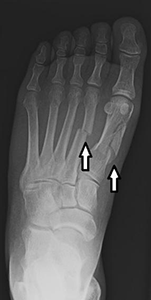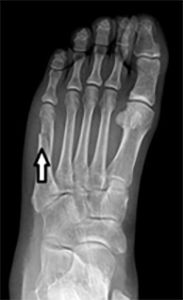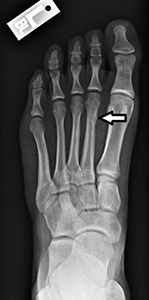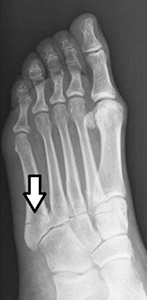Physical Therapy Videos - Foot & Ankle
What Is It?
Your foot has five long bones called metatarsals, numbered from one to five. These bones connect your foot's middle part to your toes. They can break from accidents like a heavy object falling on your foot, twisting it, or even overusing it during activities like running. How doctors treat the broken bones depends on the injury's location and movement of the joints in that area.
How It Happens
Bones can break from accidents like something heavy falling on your foot or twisting it. Sometimes, too much activity, like too much running, can cause a stress fracture.
First Steps
If you break a metatarsal, you might go to the emergency room or see your regular doctor. They will take x-rays to check the broken bone. They might give you a splint, crutches, and pain medicine. You should keep your foot up and use ice to help with swelling and pain.
Treatment
Most broken metatarsals can heal without surgery. You might need a special shoe, boot, or cast. Your doctor will tell you how much weight you can put on your foot. As the bone heals in eight to twelve weeks, the pain will get better. For stress fractures, you need to rest and stay off your foot for several weeks.
Some broken metatarsals need surgery. This can happen if the bone sticks out through the skin, or if the broken parts don't line up well. Surgery can help realign the bones and hold them in place with pins, plates, or screws. A special kind of break called a Jones fracture might need surgery, especially for athletes or people who need to get back to their activities quickly. Talk to your doctor about the best treatment for you.
Recovery
If you have surgery, you'll need to stay off your foot for about six to eight weeks. You might have a cast or boot to protect it. Pins might be removed after six to eight weeks, while plates and screws might stay in. Your doctor will check your healing progress.
Long Term
Most metatarsal fractures heal well, and people can get back to their activities without problems. Sometimes, the bone doesn't heal right, and you might need more treatment or have to change your activities. Some people might have pain even after the bone heals.
Physical Therapy Videos - Foot & Ankle
More Information
- American Academy of Orthopedic Surgeons
- American Orthopedic Foot and Ankle Society
---
Alan T. Kawaguchi, MD
Edited by the OTA Patient Education Committee and David Sanders, MD (section lead)
All x-rays and pictures taken from the personal collection of Dr. Kawaguchi





